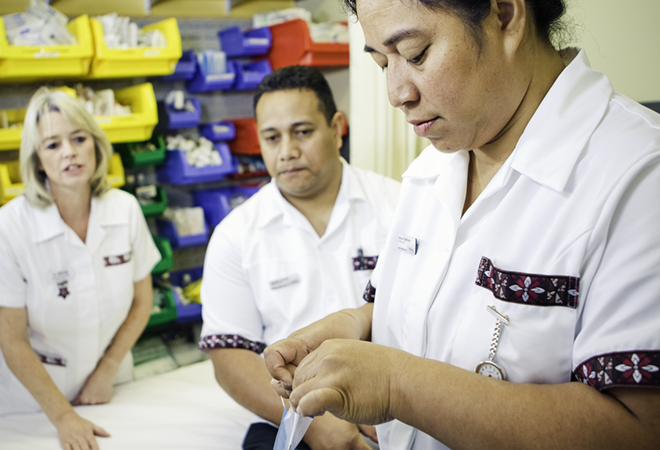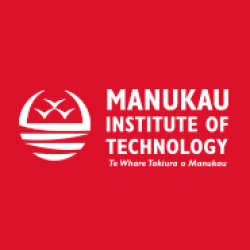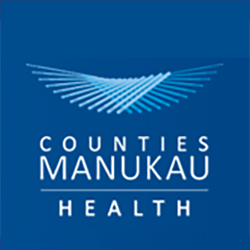
PROJECT
Perioperative interprofessional Dedicated Education Unit
Supporting learners,
Educational outcomes,
Workplace learning
Health Science
Status
Completed: 31 August 2018
Project Details
A project to evaluate the benefits of an Interprofessional Dedicated Education Unit in the perioperative setting at Middlemore Hospital and Manukau Surgery Centre. A collaboration of Manukau Institute of Technology, Counties Manukau Health and University of Auckland.
Aims:
The aims of the project are to:
- support interprofessional learning for students (Nursing and Medicine) in the perioperative setting
- support interprofessional learning and collaborative practice through shared learning opportunities for students and staff in the DEU and socialisation of students from different disciplines
- explore the potential to include students from other disciplines in this setting, such as anaesthetic technicians.
Methodology:
- a qualitative descriptive design will be utilised through questionnaires to capture student’s attitudes to interprofessional learning
- to supplement the findings of the students pre- and post-questionnaires, focus groups and/or individual interviews will be undertaken with two additional groups
- all focus group and individual interviews will be audio-taped and transcribed. Member checking will be used to ensure that interviews have been accurately transcribed and interpreted.
Team

Dr Willem Fourie
Project leader
Manukau Institute of Technology
Maria Vitas
The University of Auckland
Victoria Crisp
Counties Manukau Health
Jackie Reid
Counties Manukau Health
Alex Zivaljevic
Manukau Institute of Technology
Sharon Rydon
Manukau Institute of Technology
Kusum Narayan
Manukau Institute of TechnologyStatus
Funding
$23,720.00 (excl GST)
$10,000.00
Regional Hub Project Fund
$13,720.00
Manukau Institute of Technology, Counties Manukai Health, and The University of Auckland
Key Findings
- The four main themes identified in the qualitative analysis of student feedback were:
• Working in a team
Participants described appreciating the roles of others as well as the support they gained from the team. A supportive team and work environment was seen as developing confidence and competence in students, as well as the ability to effectively communicate with others in an interprofessional team.
• Learning together
The IPDEU experience contributed to a sense of work readiness in the students and teachers by increasing confidence and competence. It also facilitated an understanding of the roles of other health professionals.
• Feeling supported
The IPDEU experience enabled participants to develop confidence and competence which they felt led to improved care for clients. The support they received provided motivation for them to want to participate, grow their skills, and do well.
• Recognising challenges
The main challenge was that it was difficult to find balance between clinical time and the provision of learning and teaching sessions. The timing of the education sessions was problematic in terms of the CLN being able to consistently involve all students at a point in their perioperative experience that was optimal for them as individuals. The provision of information and the promotion of the DEU concept was sometimes problematic with students starting at very different times, which sometimes prevented a shared orientation where this sharing of information could have been undertaken. - Generally the perioperative IPDEU experience was regarded as positive and supported students in understanding and discussing their roles, understanding the roles of others, feeling comfortable as part of the interprofessional team, expressing their opinions, and improving their teamwork skills.
- Interprofessional collaborative learning would very likely help to reduce barriers between health professionals that may typically exist related to stereotypes associated with various health professions. Students described seeing open communication between professions and agreed that the perioperative team encourages equal respect for all professionals in the team.
Key Recommendations
- Respondents suggested the following improvements to the IPDEU:
• Define the DEU and its objectives and sessions
• Have more structured sessions and activities
• Time the sessions better, e.g. earlier in placement
• Students to have more interaction outside of the structured sessions - Students advocated for more time, exposure, and planned interprofessional experiences. For many students there were limited opportunities for interprofessional learning because of their schedules. Students also advocated for a shared orientation session.
- Students supported the future extension of the concept to include students from other disciplines, especially those from the allied health workforce. When asked what other professions they would like to see included in interprofessional learning, respondents gave a varied list including: occupation therapists; physiotherapists; social workers; dietitians; midwives; pharmacists; imaging staff; and orderlies.
A report prepared by Dr Willem Fourie, Bev McClelland, Maria Vitas, Victoria Crisp, Wendy McKinstry, Jackie Reid, Alex Zivaljevic, Sharon Rydon and Kusum Narayan.
(PDF, 383 KB, 20-pages).
- 30 August 2018